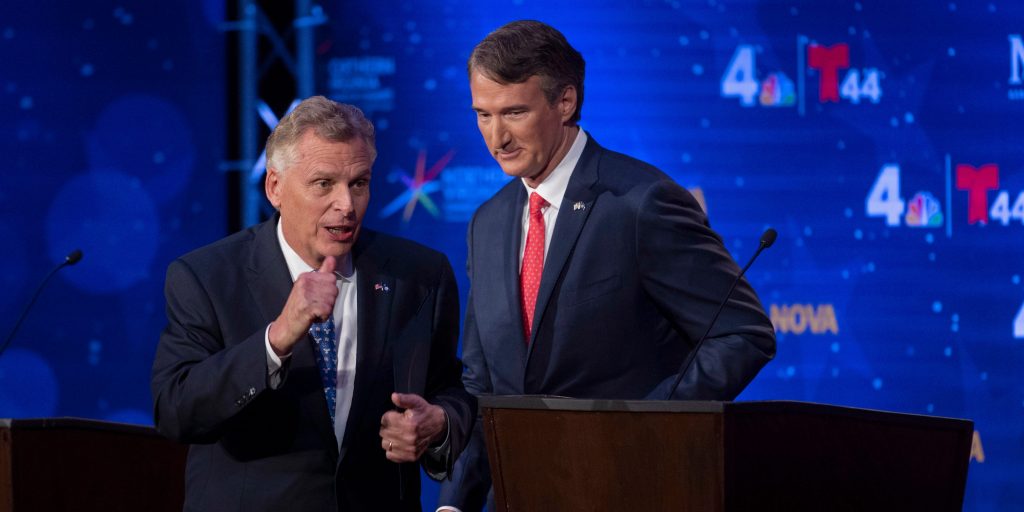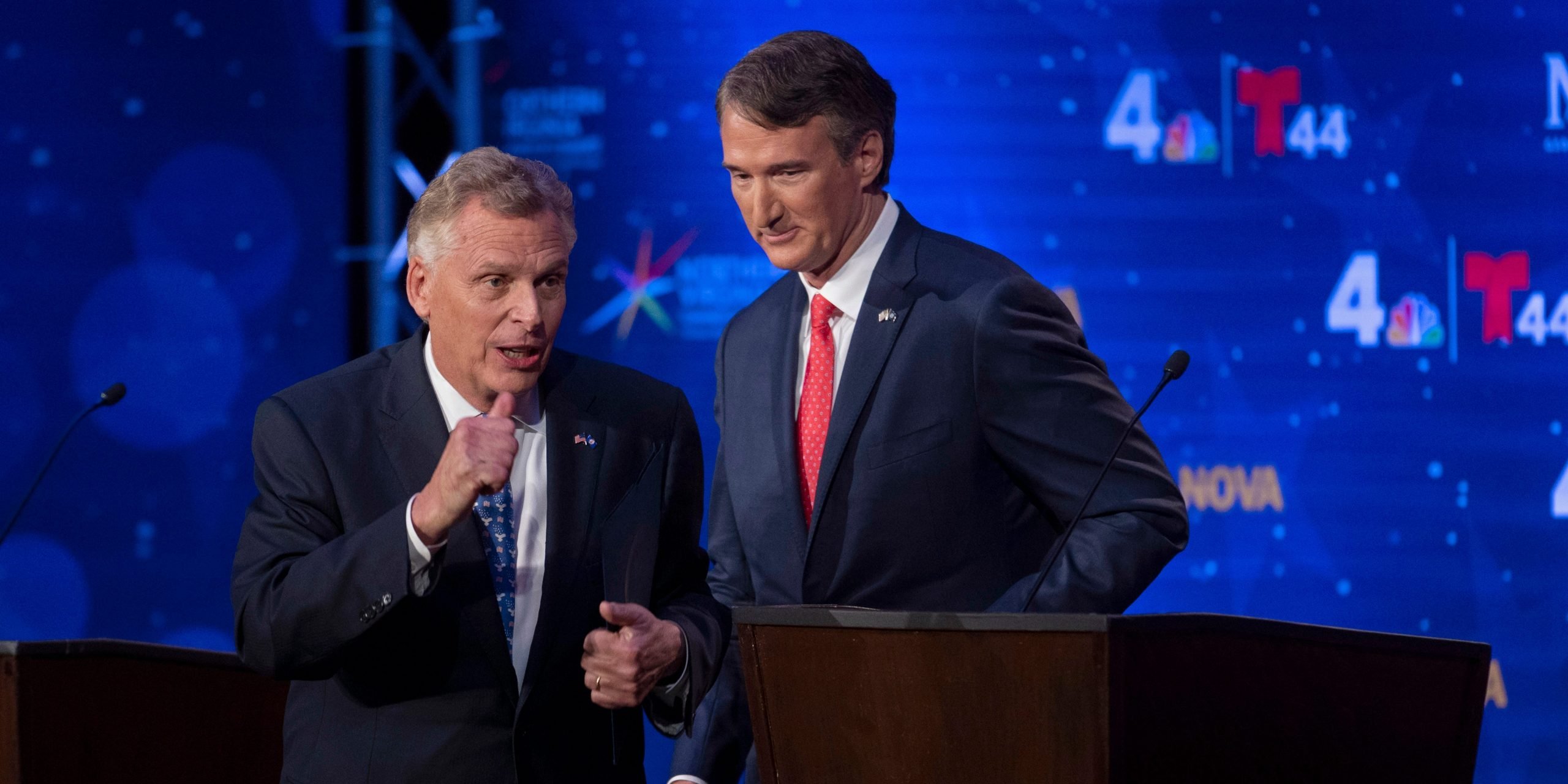
AP Photo/Cliff Owen
F
ormer Virginia Gov. Terry McAuliffe once wrestled a 280-pound alligator to secure a $15,000 campaign donation for President Jimmy Carter's 1980 reelection campaign. In 2009, the former Democratic National Committee Chairman ran unsuccessfully for his party's gubernatorial nomination, but came back to win the nomination – and the governorship – four years later. During his time in the Executive Mansion from 2014 to 2018, McAuliffe faced a solidly-conservative GOP legislature that was resistant to many of his legislative proposals. However, as the longtime Democratic power broker seeks to win his old job back in the November general election, he faces a test unlike any that he's encountered in the past – with his race serving as a barometer of the current political alignment of the Old Dominion.
Democrats have been ascendant in the state for over a decade now – with key wins that included former President Barack Obama's 2008 and 2012 victories, Ralph Northam's 2017 gubernatorial victory against former Republican National Committee Chairman Ed Gillespie, the party taking full control of the state legislature after the 2019 elections, and now-President Joe Biden's double-digit triumph against then-President Donald Trump last fall.
Republicans – who in recent years have nominated a string of candidates that struggled with the ever-growing suburban vote – have not won a statewide race in Virginia since 2009. But this year, GOP delegates nominated Glenn Youngkin, a former private equity executive and first-time political candidate who has so far been able to speak to conservative issues in way that has united the party's business class and its dominant Trump wing. The Republican approach, along with Biden's slumping numbers in the state, have made the Virginia election a real race in the closing weeks of the campaign.
Despite the state's recent Democratic-leaning orientation, Quentin Kidd, director of the Wason Center for Civic Leadership at Christopher Newport University in Newport News, Va., told Insider that there still remains a strong GOP base of reliable supporters. "Republicans consistently turn out a million or a little over a million voters consistently, even when they've lost massively," he said.
With the dominant Democratic Party facing an energized GOP, what do the dynamics of the electorate reveal about Virginia's political identity?
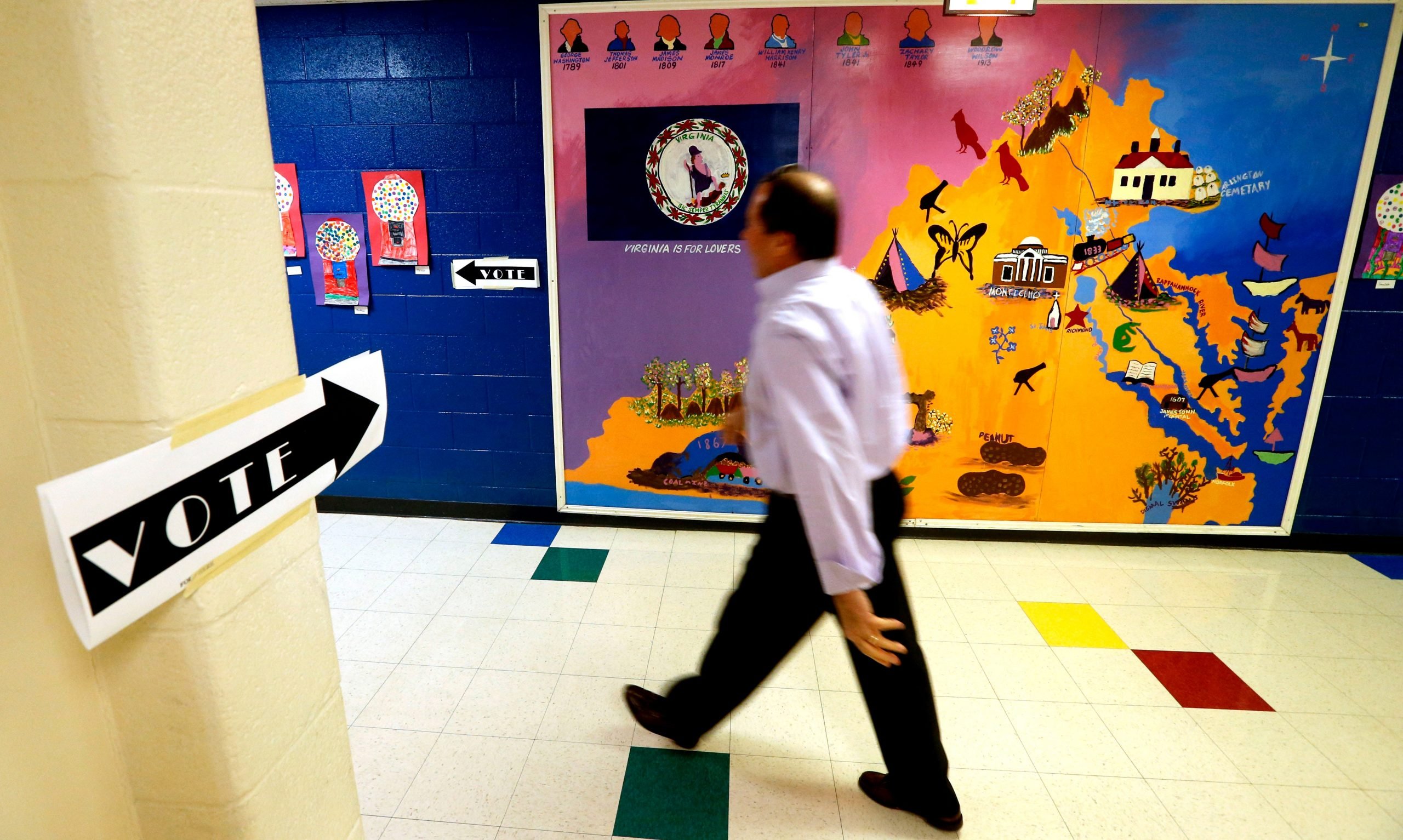
AP Photo/Steve Helber
The importance of the suburban vote can't be overstated
From the 1970s through the 1990s, Republican presidential victories in Virginia were powered by the state's fast-growing suburban areas in northern Virginia, the Richmond metropolitan area, and Hampton Roads, which form the core of the vote-rich "Golden Crescent." However, from the late 2000s through the last decade, many suburban localities, including populous Loudoun, Prince William, and Henrico counties, began to support Democrats on the presidential level. This shift, which was already ongoing as the GOP became more ideologically conservative, was exacerbated by Trump's deep unpopularity in these suburbs, which are filled with college-educated moderates and independent voters who have become more receptive to Democratic messaging. Minority voters, notably Black, Latino, and Asian residents, are also increasingly becoming a part of the suburban electoral calculus.
In northern Virginia, where McAuliffe and Youngkin both reside, Democrats have had striking success in recent election cycles. In 2019, northern Virginia boasted a population of 2.8 million residents and the region's votes made up 32% of the total statewide count in last year's presidential election, according to The Washington Post. The party handily carried the region by 32% in the 2017 gubernatorial election won by Northam, who is term-limited and ineligible to run for reelection. By running for a second, nonconsecutive term in office, McAuliffe is hoping to pull off a rare feat in Virginia - the last governor elected to two terms was Mills Godwin, who served in office from 1966 to 1970 as a Democrat and from 1974 to 1978 as a Republican.
A recent poll released by the Wason Center on Oct. 8 showed McAuliffe ahead of Youngkin 49%-45% with likely voters - the survey had a margin of error of 4.2%. In the same poll, Youngkin led among independents by a 50%-41% margin.
J. Miles Coleman, the associate editor of Sabato's Crystal Ball at the University of Virginia Center for Politics, which currently classifies the race as "leans Democratic," told Insider that Youngkin has a compelling personal story as a native Virginian who earned a basketball scholarship to play at Rice University and went on to earn an MBA at Harvard before eventually amassing a fortune of over $300 million at the helm of the Carlyle Group. "The Republicans have a fairly attractive candidate in Youngkin," he said. "He's not hated as much Trump is here, that's for sure. He kind of has an uplifting life story, and I think he's probably better positioned to appeal to some of those suburban voters who used to be Republicans but now vote for Democrats. He has tried to touch on some themes of law and order with a softer edge than Ed Gillespie ... at this time four years ago we were talking about MS-13," a reference to the violent street gang.
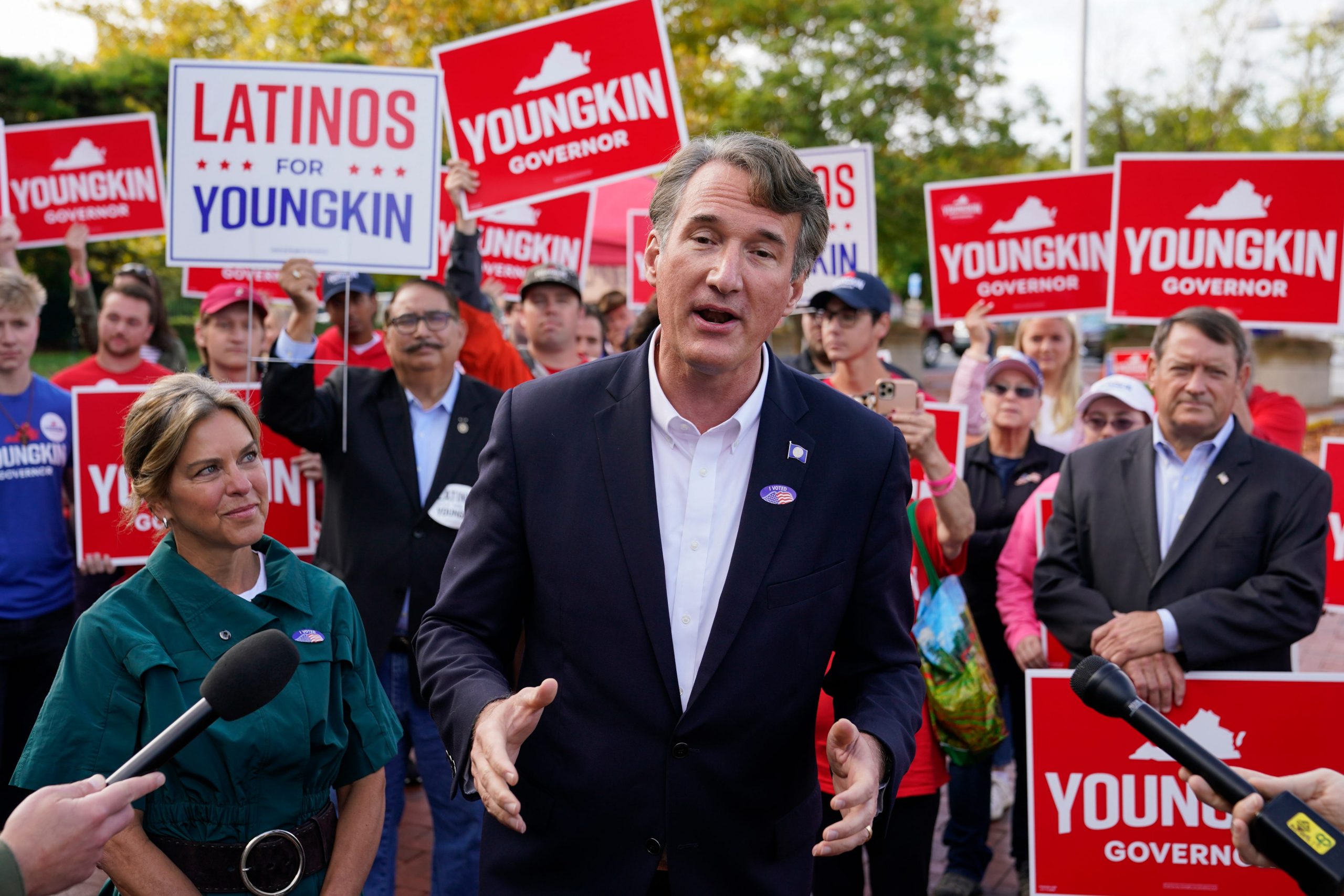
AP Photo/Patrick Semansky
McAuliffe has been unable to cast Youngkin as unacceptable to swing voters
Republicans are bullish on their support among some of the very same independents who have backed Democrats like Northam and Biden, along with lawmakers like Sens. Mark Warner and Tim Kaine. McAuliffe has consistently sought to tie Youngkin to Trump, as well as raise concerns about access to abortion in the wake of the implementation of a highly restrictive Texas law that effectively bans the procedure after the sixth week of pregnancy. The former governor has also chided Youngkin for opposing COVID-19 vaccine mandates in an appeal to independents who back such measures. Youngkin, who has been vaccinated, disagrees with the mandates and said last month that getting inoculated is a personal decision.
The former governor has also criticized Youngkin for invoking critical race theory, which examines how America's history of racism continues to reverberate through laws and policies that exist today; it is a discipline that is generally not taught in K-12 schools, but Youngkin has pledged "ban" it on his first day in office.
McAuliffe, who is known for being a disciplined campaigner, has had a tough time linking Youngkin to the former president in the minds of many swing voters. Kidd, the Wason director, told Insider that even if Youngkin comes up short in his campaign, he could provide a roadmap for the Virginia GOP as they seek an escape from the political wilderness. "Glenn Youngkin may not win, but Republicans may have found a way to thread the needle between Trumpism and economic conservatism, which they have struggled to do," he said. "Youngkin seems to be walking a tightrope pretty effectively in some ways. He embraces Trump just enough, but not too much, and he distances himself from Trump just enough, but not too much."
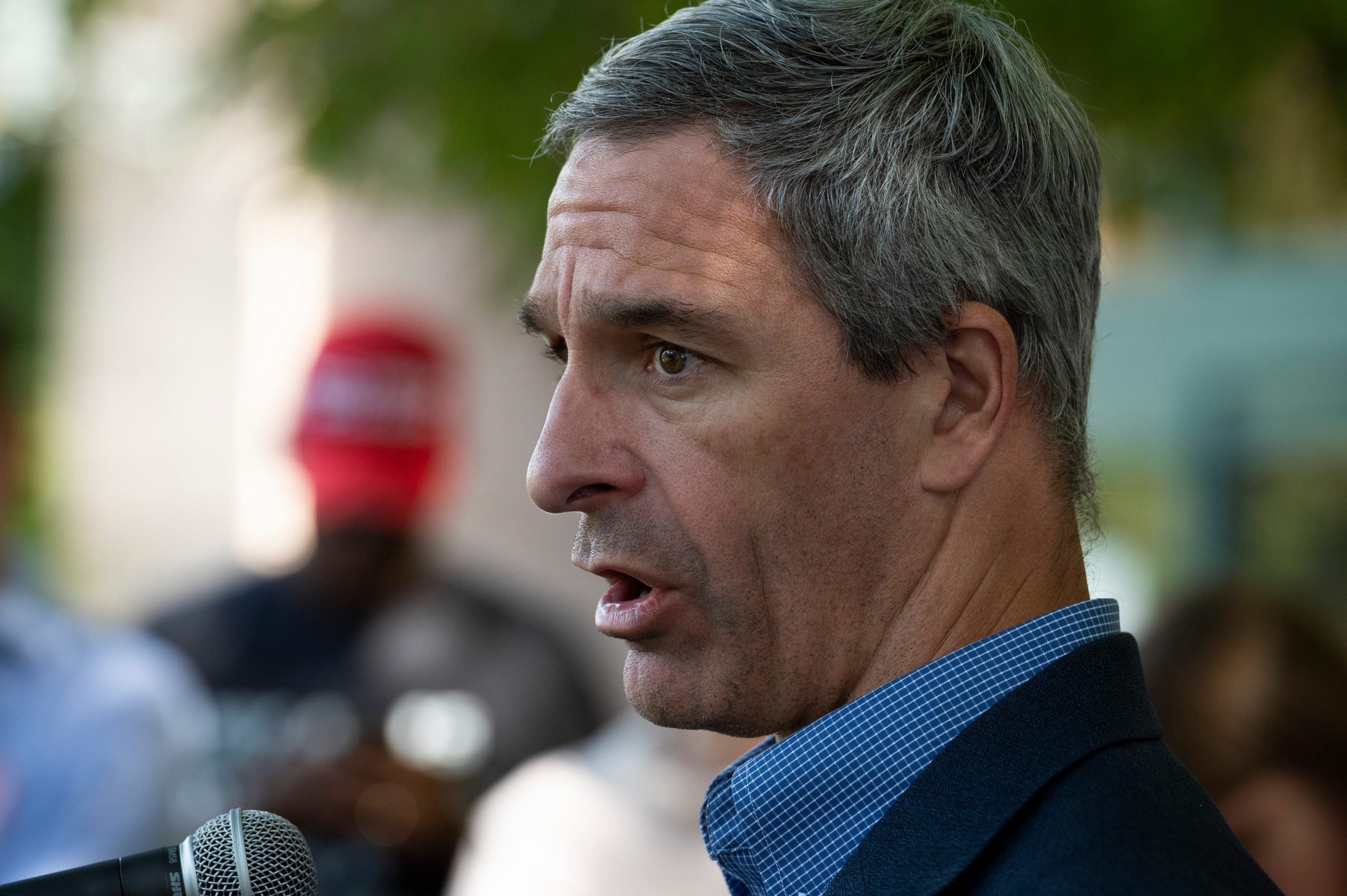
AP Photo/Cliff Owen
The conservative vote in the state remains influential
Despite Democrats currently holding all major statewide offices in Virginia, the GOP still holds 45 out of 100 seats in the House of Delegates and 19 out of 40 seats in the Senate. This year, every House seat is up for grabs, with Democrats angling to retain the majority that they clawed back in 2019. In addition to partisan gerrymandering, a major reason why Democrats struggled to regain control of many suburban-based House districts in the last decade prior to Trump's election was low turnout.
In 2009, the last year that Democrats lost a gubernatorial election in Virginia, Republicans were eager to elect former state Attorney General Bob McDonnell and he won in a 59%-41% landslide over state Sen. R. Creigh Deeds. Overall turnout that year was 40.4%, according to the Virginia Department of Elections. In 2013, when McAuliffe was elected governor, turnout hit 43%, which provided the lift he needed to defeat then-GOP state Attorney General Ken Cuccinelli by a 48%-45% margin. In 2017, Northam beat Gillespie by a 54%-45% spread, with a 47.6% turnout rate fueled by Democratic dissatisfaction with the Trump administration.
Kidd told Insider that inconsistent Democratic turnout has been a lingering issue for the party. "Democrats flex all over the place with their numbers," he said. "They either turn out 1.4 or 1.5 million voters, or they turn out 800,000. Democratic losses since Obama's election in 2008 have been because they don't show up, and close wins have happened because they don't show up. In 2014, Mark Warner pulled it out [US Senate race] by the skin of his teeth, and it's because Democrats were sort of chagrined about the state of everything going on in the country."
While Republicans have faltered in northern Virginia in recent cycles, they still have a solid base of support in many exurban communities in the state, especially in the Richmond area and Hampton Roads, and they continue to dominate in the rural countryside, which includes Southwest Virginia.
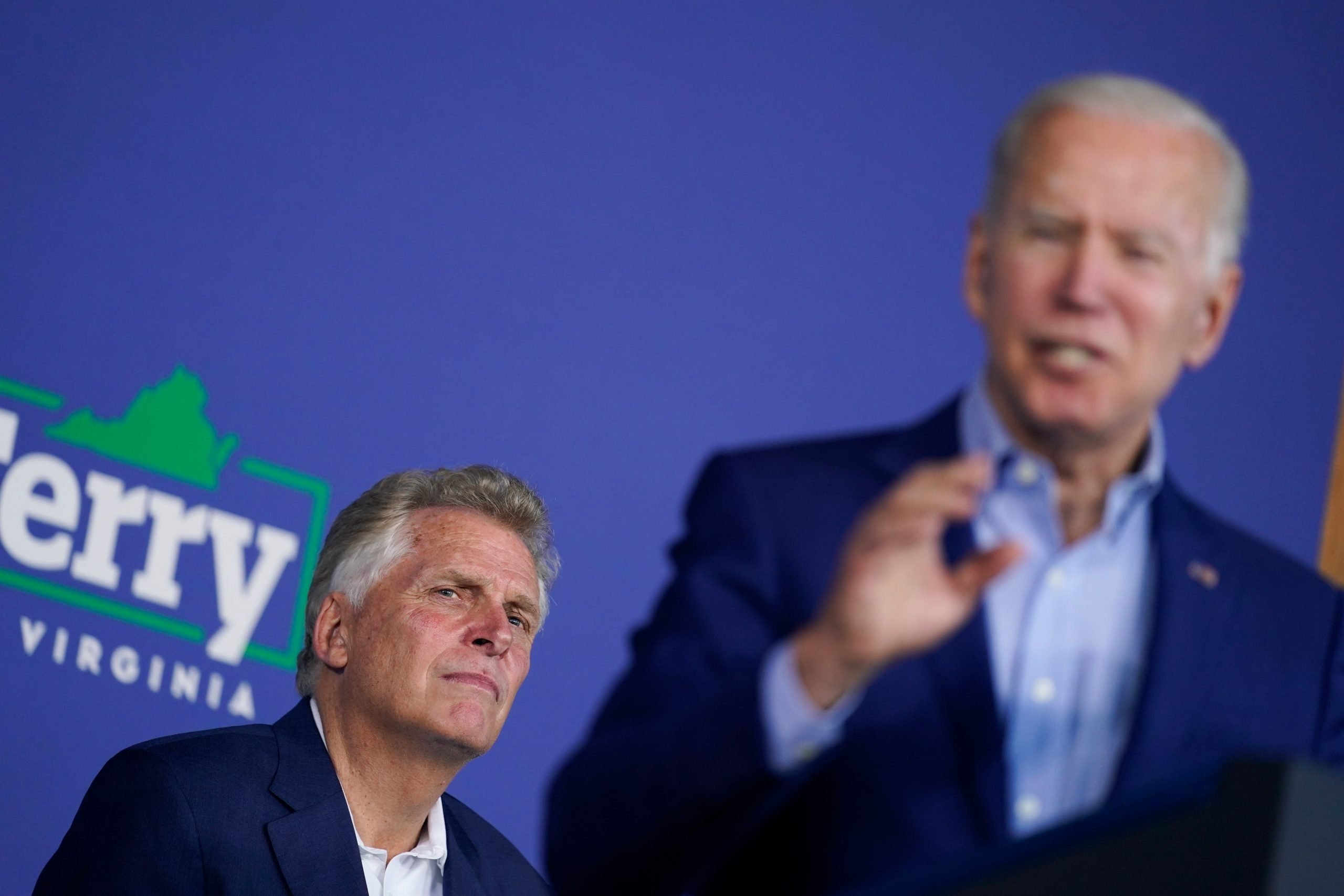
AP Photo/Andrew Harnik
The election is inextricably linked to Washington, DC
Last fall, Biden captured Virginia and its 13 electoral votes, winning the state by 10 points (54%-44%) in a year where Democrats were especially mobilized against Trump. However, months after the president took office, unexpected turbulence with the administration's handling of the COVID-19 pandemic, along with the withdrawal of US troops from Afghanistan and a stalled domestic agenda in Congress have removed much of the luster from his numbers.
In the Washington Post-Schar poll, Biden's approval rating in Virginia sat at 46%, with 51% disapproving. During a virtual meeting with supporters last week, CNN reported that McAuliffe mentioned Biden's sagging approval figure in the state. "We are facing a lot of headwinds from Washington, as you know," he said on the call. "The President is unpopular today unfortunately here in Virginia, so we have got to plow through." While the former governor brushed off the comments, the legislative inaction prompted him to state that the $3.5 trillion price tag for the Democratic-led infrastructure bill was "too high."
During a Tuesday interview with The Associated Press, McAuliffe called on Democratic lawmakers in Washington, DC, to "do your job" and do "whatever it takes" to pass substantive legislation. "They got to get their work done," he told the news agency. "People are counting on them."
In a state filled with federal workers and military veterans, residents are very much attuned to what emanates from the nation's capital, and McAuliffe clearly wants to see results, Coleman told Insider. "From his perspective, he just wants something passed," he said. "He wants to at least have the perception that Biden is able to pass his priorities. I think you'll see some Democrats across the country kind of trim their sails like him and say, 'We just want something that we can show the voters and say that this was what we've done.'"
